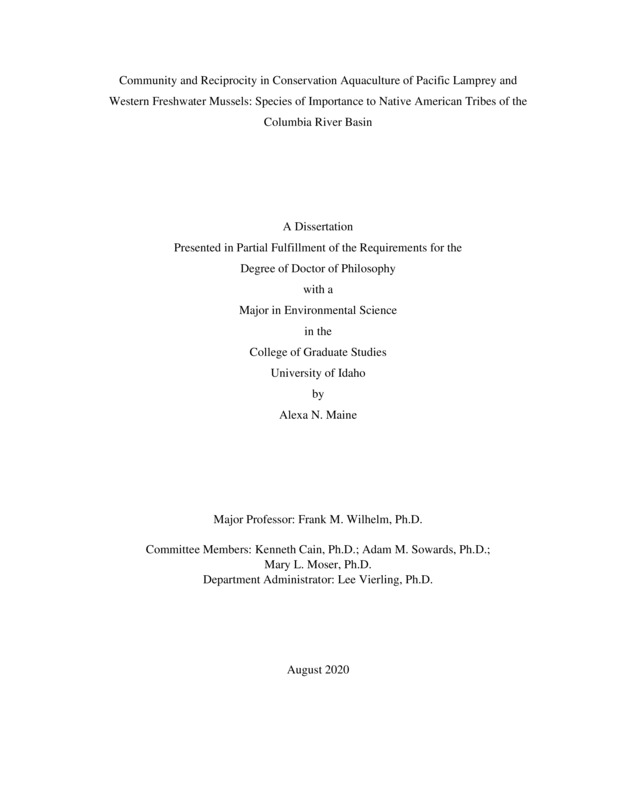Community and Reciprocity in Conservation Aquaculture of Pacific Lamprey and Western Freshwater Mussels: Species of Importance to Native American Tribes of the Columbia River Basin
Maine, Alexa. (2020-08). Community and Reciprocity in Conservation Aquaculture of Pacific Lamprey and Western Freshwater Mussels: Species of Importance to Native American Tribes of the Columbia River Basin. Theses and Dissertations Collection, University of Idaho Library Digital Collections. https://www.lib.uidaho.edu/digital/etd/items/maine_idaho_0089e_11901.html
- Title:
- Community and Reciprocity in Conservation Aquaculture of Pacific Lamprey and Western Freshwater Mussels: Species of Importance to Native American Tribes of the Columbia River Basin
- Author:
- Maine, Alexa
- ORCID:
- 0000-0002-9382-2948
- Date:
- 2020-08
- Program:
- Environmental Science
- Subject Category:
- Environmental science; Aquatic sciences; Natural resource management
- Abstract:
-
Columbia River Plateau tribes, such as the Confederated Tribes of the Umatilla Indian Reservation (CTUIR), have developed sustainable relationships with communities of food resources throughout the Pacific Northwest (PNW) since time immemorial (i.e., as far back as time is recalled or recognized). These relationships are evident in tribal creation stories, where plants and animals offered themselves to sustain humans, and in turn humans were given the responsibility of reciprocity—to take care of the foods that take care of them. Today, indigenous organizations like the CTUIR fulfill the promise of reciprocity by developing research programs that are focused on restoring ecological and cultural services. For many indigenous groups, traditional ecological knowledge (TEK) drives these programs and restoration objectives. Policies and management frameworks that are based on TEK promote the restoration of both physical and biological river processes that include important interspecies linkages and community interactions (Chapter 2).
Interactions between First Foods, traditional foods of cultural importance (e.g., water, fish, big game, roots, and berries), and their environments are critical to tribal natural resource management. The populations of two First Foods, Pacific Lamprey Entosphenus tridentatus and native western freshwater mussels, are declining in the Columbia River Basin in the western United States. Specific reasons for these declines are not well understood but are linked to changes to the biotic and abiotic features of the system. Physical habitat alterations, declining water quality and quantity, and changes to the biotic community structure of the river are possible factors that are affecting population declines of lamprey, mussels, and other native aquatic species (e.g., salmon, trout, and nongame native fishes). The loss of cultural connection to Pacific Lamprey and native freshwater mussels and the loss of the ecological services that are provided by these organisms are understudied elements of most Pacific Northwest aquatic-restoration projects.
The positive contributions of lamprey and mussels to the river environment have been explored through limited studies. For example, larval lamprey can affect the benthic microbial community structure, promoting more aerobic than anaerobic microbial species. They also contribute to nutrient cycling, processing organic matter and waste products from other river organisms. Freshwater mussels provide numerous ecosystem services to the river community, including water filtration, nutrient cycling and storage, and food-web connections. For example, macroinvertebrate communities associated with mussel beds are larger and more diverse than those not associated with mussel beds; these macroinvertebrate communities in turn provide food and ecosystem services for other river organisms. Mussels are reliant on fishes to provide nutrients and transportation to their larvae, which transform into juveniles while on the fishes. Reciprocity drives community interactions and flows from the benthos to higher and lower trophic levels.
The community interactions that are observed in the river environment can be further investigated through laboratory study to improve culture techniques for both lamprey and mussels. Lamprey and mussels require artificial propagation and laboratory culture to supply organisms for research and restoration. Providing community interactions during laboratory rearing can benefit cultured organisms. In this dissertation, I use macro- (teleost fishes) and micro- (bacteria) organisms to study community interactions in the context of artificial propagation and rearing of freshwater mussels (Chapter 3) and Pacific Lamprey (Chapters 4 and 5).
A healthy, thriving community in any freshwater system requires that all parts of the system are functional and connected, a sentiment popularized for a western audience by Aldo Leopold’s Land Ethic essay in the 1940s. Aquatic restoration projects that are implemented to improve habitat for salmonids can also serve to improve habitat for benthic organisms like larval Pacific Lamprey and native freshwater mussels with little extra effort or expense. To restore populations to harvestable abundances, inclusion of lamprey and mussels in ongoing habitat restoration projects should be a priority for Columbia Plateau tribes, and other agencies. Using Leopold’s Land Ethic principles, I discuss ecological benefits of including lamprey and mussels in ongoing salmonid restoration projects, explore a case study of this in action for a tribal project, and present a call to action for regional restoration practitioners to acknowledge and include the benthic community in river restorations—a “benthic ethic” (Chapter 6).
- Description:
- doctoral, Ph.D., Environmental Science -- University of Idaho - College of Graduate Studies, 2020-08
- Major Professor:
- Wilhelm, Frank M
- Committee:
- Cain, Kenneth; Sowards, Adam M; Moser, Mary L
- Defense Date:
- 2020-08
- Identifier:
- Maine_idaho_0089E_11901
- Type:
- Text
- Format Original:
- Format:
- application/pdf
- Rights:
- In Copyright - Educational Use Permitted. For more information, please contact University of Idaho Library Special Collections and Archives Department at libspec@uidaho.edu.
- Standardized Rights:
- http://rightsstatements.org/vocab/InC-EDU/1.0/

